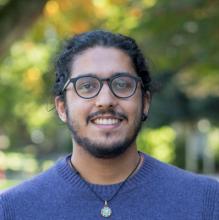Raahil Madhok
Why did you decide to pursue a graduate degree?
My undergraduate schooling and research experiences thereafter contributed to my pursuit of doctoral studies. I did my B.A. in economics and environmental studies at McGill University. In my second year, I completed a research internship in Kenya studying the impact of rural access to hydro-electricity on household welfare. This sparked my interest in academic research and I later completed my M.A. in Economics at UBC in 2015. Afterward, I completed a pre-doctoral fellowship at the Harvard Kennedy School where I made the decision to eventually pursue a PhD. I wanted to not only continue learning about the field of environmental economics but contribute to it through original cutting-edge research.
Why did you decide to study at UBC?
I decided to study at UBC for three reasons. First, it has a variety of programs and world-renowned faculty active at the intersection of economics and environmental policy, where my research interest lies. Second, the numerous labs, research groups, and seminar series related to my research allow for exciting opportunities to share ideas, collaborate, and expand my research network. Lastly, the beauty of Vancouver and proximity to the mountains played an important role in my decision to study at UBC.
What is it specifically, that your program offers, that attracted you?
I was drawn by the interdisciplinary, yet focused, nature of the Faculty of Land and Food Systems. In particular, I am part of the Food and Resource Economics Group, which comprises faculty members trained in economics but with interdisciplinary research interests spanning agriculture, ecology, and renewal energy. I was attracted by the emphasis on holistic research drawing from multiple disciplines as well as the many outlets for sharing research as well as connecting with students and faculty from similar programs.
What was the best surprise about UBC or life in Vancouver?
The best surprise about UBC was getting a compass card included in student fees. I was also surprised by the vast amount of student resources, clubs, and activity groups. Regarding life in Vancouver, the best surprise is the proximity to beautiful lakes, hikes, and camping opportunities.
What aspect of your graduate program do you enjoy the most or are looking forward to with the greatest curiosity?
I enjoy our weekly seminar series in environmental economics the most. It is a stimulating environment that is relaxed yet serious. I look forward to hearing about cutting-edge research by visiting speakers from around the world. The series also features work-in-progress talks for other doctoral students to present potential dissertation ideas in a non-stressful environmental and receive constructive feedback from the faculty. I look forward to presenting at the seminar in the future as well as learning about the projects of my colleagues.
What do you see as your biggest challenge(s) in your future career?
I foresee the biggest challenge in my future career to be bridging the gap between research and policy. My research is evidence-based and has implications for environmental policy and decision-making at a national level. For example, providing evidence on the health impacts of coal energy has policy implications for changing the energy mix. Quantifying species loss from infrastructure encroachment into forests has implications for conservation policy. However, translating these results into policy action is a complex multi-faceted process requiring extensive communication and approvals across many stakeholders.
What aspects of your life or career before now have best prepared you for your UBC graduate program?
After completing my bachelors, I worked at the research institute J-PAL for two years in India on a project evaluating a cap-and-trade program for particulate matter pollution. The project was overseen by two economists but the day-to-day work involved liaising with government officials, environmental engineers, and industry professionals. The work highlighted the interdisciplinary nature of most policy-relevant work and prepared me for doctoral studies at the intersection of several disciplines.
What do you like to do for fun or relaxation?
I am part of two local improv theatres taking classes as well as performing. Improv comedy is my primary hobby and allows me to fully take my mind off my PhD work. I get to live in the moment, think on my feet, and laugh uncontrollably. I also volunteer at an after school program for students in grade 5 and 6. We play sports, make arts and crafts, and go on field trips.
What advice do you have for new graduate students?
Find a hobby that can take your mind of research or coursework. Graduate school has a tendency to consume an unhealthy amount of time, and it is important to stay grounded and mentally healthy. A hobby where you can be in the moment, have fun, and not think about your work for a few hours a week can make a positive difference to your productivity and outlook.
